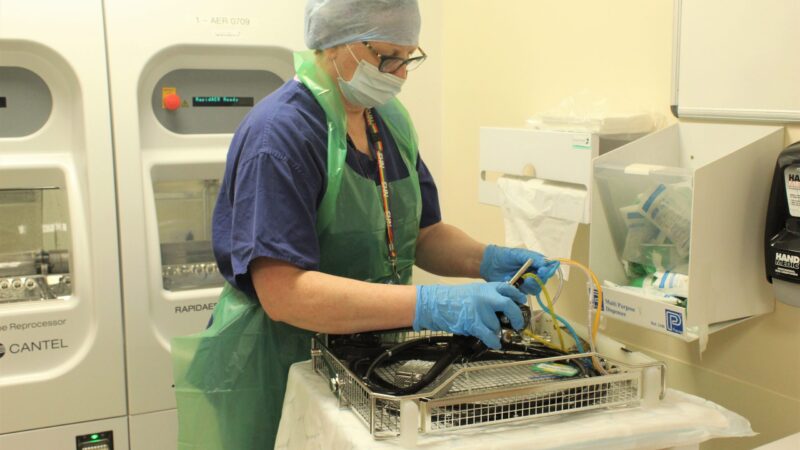
A recent investment in some new state-of-the-art machinery at the endoscopy decontamination unit means our endoscopy service can process more scopes per hour.
This increases productivity, reliability and traceability and ultimately allowing more patients to be seen per clinic.
The process for cleaning and disinfecting the endoscopes used for these procedures is a thorough one. And the sterile services team at NTH Solutions work very hard in the background ensuring that it all runs smoothly.
NTH Solutions is the Trust’s subsidiary and provider of support services.
Endoscopes are long, thin, flexible tubes that have a light and camera at one end)
Once a procedure is complete, the endoscope (a long, thin, flexible tube that has a light and camera at one end) is passed through a hatch to the sterile services team who then run through a number of checks. This includes pre-cleaning and leak testing techniques before the scope is put into an AER (automated endoscope reprocessor) for a high disinfectant clean cycle. The Cantel AER machine guarantees security, traceability and increased productivity.
The scopes are very delicate and valuable pieces of equipment. This is why they are scanned for traceability at each step in the process. It also prints out a receipt showing it has undergone all the relevant checks and cleaning steps which is kept with the patient’s records.
After the sterile services assistant has scanned to say they have received the scope, they manually clean and rinse the scope using specialist equipment. It flushes water through to ensure there is no damage to the scope and there are no blockages.
Once this is done the scope can be scanned and put into the AER for a 20 minute cycle time. It must be used within a three hour window.
New editions to the endoscopy unit
The department has recently installed new Cantel AER units. This means the unit can process nine scopes per hour in total, 72 per day.
With the current average clinic lists, the team usually use around 33 scopes per day but there is ‘scope’ to expand and offer the service to other local healthcare providers.
Another new piece of equipment within the unit is two Cantel endoscope storage cabinets – effectively a special drying unit. Once a scope is placed inside, it can be used within seven days allowing more flexibility and preparation over weekends.
The team also have a special Cantel SureStore unit which can vacuum bag the scopes. It allows them to be stored and used within 100 days. These are often placed on emergency trolleys which are not used as frequently.
Derek Watson is our head of decontamination services. He said: “The addition of the new AER machines and the drying cabinets have meant our service is future proofed. What’s more it can be extended to more local healthcare providers too, meaning that more patients can be seen not just within our own Trust but across the whole region.
“The endoscopy staff have worked closely with the sterile services team to learn how to use the new equipment and remove the scopes from the drying cabinets.
“During the installation of the new equipment the department remained open, scopes were processed at the North Tees site and transported over to Hartlepool. This means there was no cancelled clinics and no disruption to patient care, which is our top priority.”
Medical Director Deepak Dwarakanath added: “It’s fantastic to see such an important service being improved further at our Hartlepool site. We are future proofing our endoscopy services for the organisation, ensuring patients across the Tees Valley get the very best care.”